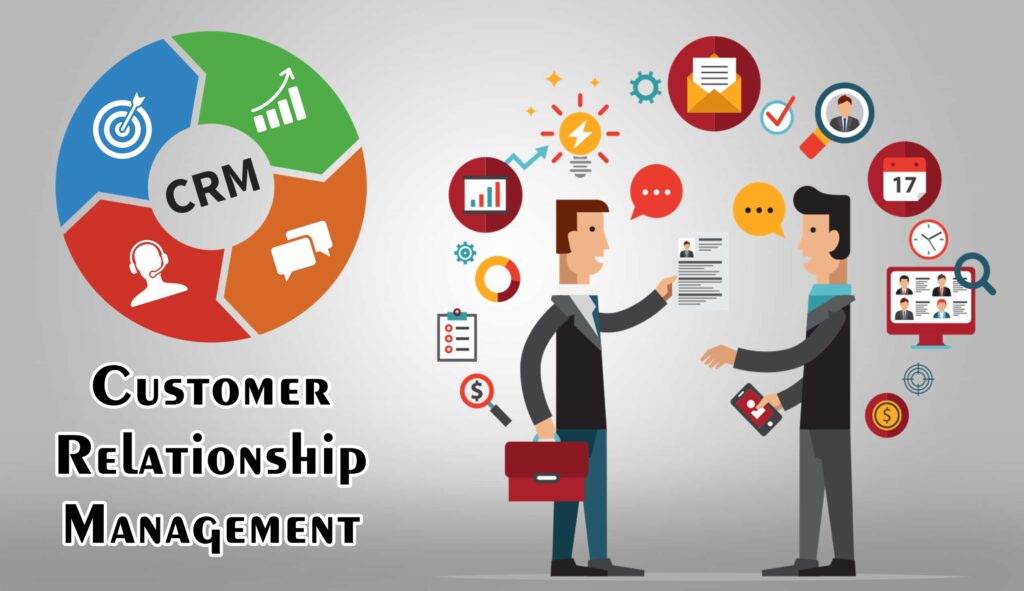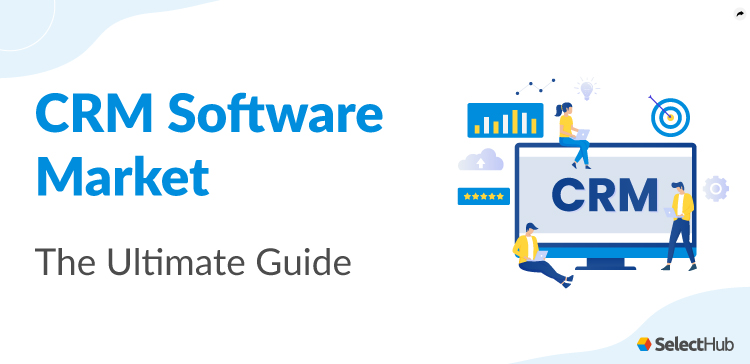Unlock Growth: Your Comprehensive Guide to CRM Marketing Software

Introduction: The Power of CRM in Modern Marketing
In today’s fast-paced business environment, staying ahead requires more than just a good product or service. It demands a deep understanding of your customers – their needs, preferences, and behaviors. This is where Customer Relationship Management (CRM) marketing software comes into play. It’s not merely a tool; it’s a strategic asset that empowers businesses to build stronger customer relationships, streamline marketing efforts, and ultimately, drive revenue growth.
This comprehensive guide delves into the world of CRM marketing software, exploring its functionalities, benefits, and how to choose the right solution for your specific needs. Whether you’re a seasoned marketer or just starting to explore the possibilities of CRM, this article will provide you with the knowledge and insights you need to succeed.
What is CRM Marketing Software? A Definition
At its core, CRM marketing software is a technology solution designed to manage and analyze customer interactions and data throughout the customer lifecycle. It centralizes customer information, allowing businesses to understand their customers better, personalize their marketing campaigns, and improve customer service. Think of it as a digital hub where all your customer-related information resides, accessible and actionable.
Unlike traditional CRM, CRM marketing software places a strong emphasis on marketing automation and campaign management. It integrates various marketing channels, such as email, social media, and SMS, to deliver targeted and personalized messages to customers. This holistic approach enables businesses to nurture leads, convert prospects into customers, and retain existing customers through ongoing engagement.
Key Features and Functionalities of CRM Marketing Software
CRM marketing software offers a wide array of features designed to streamline marketing processes and enhance customer engagement. Here are some of the most important functionalities:
- Contact Management: Centralized storage of customer data, including contact information, communication history, and purchase details.
- Lead Management: Tracking and nurturing leads through the sales funnel, from initial contact to conversion.
- Marketing Automation: Automating repetitive marketing tasks, such as email marketing, social media posting, and lead nurturing.
- Campaign Management: Planning, executing, and analyzing marketing campaigns across various channels.
- Email Marketing: Creating and sending targeted email campaigns, tracking open rates, click-through rates, and conversions.
- Social Media Integration: Managing social media presence, monitoring brand mentions, and engaging with customers on social platforms.
- Sales Force Automation (SFA): Automating sales processes, tracking sales activities, and managing sales pipelines.
- Reporting and Analytics: Providing insights into marketing performance, customer behavior, and sales results.
- Segmentation: Dividing customers into specific groups based on demographics, behavior, and other characteristics to personalize marketing messages.
- Integration: Connecting with other business applications, such as e-commerce platforms, accounting software, and customer service tools.
These features work in concert to provide a 360-degree view of the customer, enabling businesses to make data-driven decisions and optimize their marketing efforts for maximum impact.
Benefits of Using CRM Marketing Software
Implementing CRM marketing software can yield significant benefits for businesses of all sizes. Here are some of the most notable advantages:
- Improved Customer Relationships: By centralizing customer data and providing a comprehensive view of customer interactions, CRM software enables businesses to build stronger relationships with their customers.
- Increased Sales and Revenue: CRM software helps businesses identify and nurture leads, personalize marketing campaigns, and improve sales efficiency, leading to increased sales and revenue.
- Enhanced Marketing ROI: By automating marketing tasks, targeting marketing messages, and tracking campaign performance, CRM software helps businesses optimize their marketing ROI.
- Improved Customer Retention: By providing personalized customer service and proactively addressing customer needs, CRM software helps businesses retain existing customers.
- Increased Efficiency and Productivity: By automating repetitive tasks and streamlining workflows, CRM software helps businesses improve efficiency and productivity.
- Better Decision-Making: By providing access to real-time data and analytics, CRM software helps businesses make informed decisions.
- Improved Collaboration: CRM software facilitates collaboration between marketing, sales, and customer service teams by providing a shared view of customer data.
The cumulative effect of these benefits is a more customer-centric business that is better equipped to compete in today’s market.
Choosing the Right CRM Marketing Software: Key Considerations
Selecting the right CRM marketing software can be a daunting task, given the wide range of options available. However, by considering a few key factors, you can narrow down your choices and find the solution that best fits your needs. Here’s what to consider:
- Your Business Needs: Before you start evaluating CRM software, take the time to assess your business needs. What are your specific marketing goals? What are your current marketing processes? What are your pain points?
- Your Budget: CRM software can range in price from free to tens of thousands of dollars per year. Determine your budget and look for solutions that fit within your financial constraints.
- Scalability: Choose a CRM solution that can scale with your business. As your business grows, you’ll want a CRM that can accommodate your increasing customer base and marketing needs.
- Ease of Use: The CRM software should be user-friendly and easy to learn. If the software is too complex, your team may not use it effectively.
- Features and Functionality: Make sure the CRM software offers the features and functionality you need, such as contact management, lead management, marketing automation, and reporting and analytics.
- Integration Capabilities: Consider whether the CRM software integrates with other business applications you use, such as your website, e-commerce platform, and accounting software.
- Customer Support: Choose a CRM provider that offers excellent customer support. You’ll want to be able to get help quickly if you have any questions or issues.
- Security: Ensure the CRM software has robust security features to protect your customer data.
- Reviews and Ratings: Read reviews and ratings from other users to get an idea of the software’s strengths and weaknesses.
- Free Trials and Demos: Take advantage of free trials and demos to test out different CRM solutions before making a decision.
By carefully considering these factors, you can make an informed decision and choose the CRM marketing software that will help you achieve your business goals.
Top CRM Marketing Software Platforms: A Comparative Overview
The CRM market is competitive, with numerous platforms vying for your attention. Here’s a brief overview of some of the leading CRM marketing software platforms:
- HubSpot CRM: Known for its user-friendliness and comprehensive suite of marketing, sales, and service tools. HubSpot offers a free CRM option, making it an excellent choice for small businesses and startups.
- Salesforce Sales Cloud: A powerful and highly customizable CRM platform suitable for businesses of all sizes. Salesforce is known for its extensive feature set and robust integrations.
- Zoho CRM: A versatile and affordable CRM solution that offers a wide range of features, including marketing automation, sales force automation, and customer service tools.
- Microsoft Dynamics 365: A comprehensive CRM and ERP (Enterprise Resource Planning) platform that integrates seamlessly with other Microsoft products.
- Pipedrive: A sales-focused CRM platform designed to streamline the sales process and help sales teams close more deals.
- Freshsales: A sales CRM that offers a user-friendly interface and a range of features, including email tracking, lead scoring, and sales automation.
- Oracle Siebel CRM: A mature and feature-rich CRM platform that is well-suited for large enterprises.
- Insightly: A CRM platform that is popular with small to medium-sized businesses (SMBs), offering a user-friendly interface and a focus on project management.
Each platform has its own strengths and weaknesses. The best platform for you will depend on your specific business needs, budget, and technical expertise. Consider reading reviews, comparing features, and taking advantage of free trials to determine which platform is the best fit for your organization.
Implementing CRM Marketing Software: Best Practices
Once you’ve chosen a CRM marketing software platform, the next step is to implement it effectively. Here are some best practices to ensure a smooth transition and maximize the benefits of your new CRM system:
- Define Your Goals: Clearly define your goals for implementing the CRM software. What do you hope to achieve? What specific improvements do you want to see?
- Plan Your Implementation: Develop a detailed implementation plan that outlines the steps involved in setting up the CRM software, migrating your data, and training your team.
- Data Migration: Carefully migrate your existing customer data to the new CRM system. Ensure that the data is accurate, complete, and properly formatted.
- Customization: Customize the CRM software to meet your specific business needs. Configure the features and functionality to align with your marketing processes and sales workflows.
- User Training: Provide comprehensive training to your team on how to use the CRM software. Make sure they understand the features, functionalities, and best practices for using the system.
- Integration: Integrate the CRM software with other business applications, such as your website, e-commerce platform, and accounting software.
- Data Governance: Establish data governance policies to ensure that your customer data is accurate, consistent, and secure.
- Ongoing Optimization: Continuously monitor and optimize your CRM system to ensure that it is meeting your needs. Regularly review your data, analyze your results, and make adjustments as needed.
- User Adoption: Focus on driving user adoption. Encourage your team to use the CRM software regularly and provide ongoing support to help them become proficient users.
- Security Measures: Implement strong security measures to protect your customer data, including access controls, encryption, and regular backups.
By following these best practices, you can ensure a successful implementation and maximize the value of your CRM marketing software.
CRM Marketing Software and the Future of Marketing
The future of marketing is inextricably linked to CRM marketing software. As technology continues to evolve, CRM platforms will become even more sophisticated, offering new capabilities and insights. Here are some trends to watch:
- Artificial Intelligence (AI) and Machine Learning (ML): AI and ML will play an increasingly important role in CRM marketing software, enabling businesses to automate tasks, personalize customer experiences, and gain deeper insights into customer behavior.
- Hyper-Personalization: CRM software will enable businesses to deliver highly personalized marketing messages and experiences to individual customers, based on their unique preferences and behaviors.
- Omnichannel Marketing: CRM platforms will integrate seamlessly with all marketing channels, allowing businesses to deliver consistent and personalized experiences across all touchpoints.
- Data Privacy and Security: With increasing concerns about data privacy, CRM software will need to prioritize data security and comply with data privacy regulations, such as GDPR and CCPA.
- Integration with Emerging Technologies: CRM software will continue to integrate with emerging technologies, such as augmented reality (AR), virtual reality (VR), and the Internet of Things (IoT), to create new marketing opportunities.
- Emphasis on Customer Experience (CX): CRM software will play a central role in helping businesses deliver exceptional customer experiences, which will become increasingly important in the future.
By embracing these trends, businesses can leverage CRM marketing software to stay ahead of the curve and create a competitive advantage.
Conclusion: Harnessing the Power of CRM Marketing Software
CRM marketing software is a powerful tool that can transform the way businesses interact with their customers. By centralizing customer data, automating marketing tasks, and providing insights into customer behavior, CRM software enables businesses to build stronger customer relationships, increase sales and revenue, and improve marketing ROI.
Choosing the right CRM marketing software and implementing it effectively requires careful planning and execution. By considering your business needs, budget, and technical expertise, you can select the platform that best fits your organization. By following best practices for implementation and embracing the latest trends, you can leverage CRM marketing software to achieve your business goals and stay ahead of the competition.
The future of marketing is customer-centric, and CRM marketing software is at the heart of this transformation. Embrace the power of CRM, and unlock the potential for sustainable growth.




